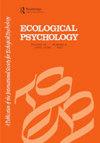生态神经科学:我们的资源从减少到增加
IF 1.7
3区 心理学
Q3 PSYCHOLOGY, EXPERIMENTAL
引用次数: 6
摘要
在一种常见的观点中,人类活动可以用神经过程来解释,因为这些过程实现了构成显性行为基础的心理功能。在生态学方法中,这种解释被认为是不可解释的,因为它们具体化了它们希望解释的现象。我们认为,生态心理学为这种物化提供了一种解毒剂,如共振、调谐和预期等概念,如果它们被认为是关系的、涉及世界的活动。我们的主要主张是,我们可以把对神经现象的科学解释本身理解为对社会物质实践的一种调和。这使我们能够将神经科学过程理解为使生物体-环境系统产生共鸣的条件。在这种观点中,神经科学和心理现象通常在广泛不同的社会物质实践中被发现。但是我们偶尔可以实现这些实践之间的协调。建立心理现象对神经事件的依赖性是我们发展并产生共鸣的一种新实践的成就。因此,我们越想了解神经系统内部发生的事情,我们就越需要仔细研究我们这样做的社会物质环境。本文章由计算机程序翻译,如有差异,请以英文原文为准。
Ecological Neuroscience: From Reduction to Proliferation of Our Resources
Abstract In one common view, human activity is explained by neural processes, because these implement psychological functions that underlie overt behavior. In the ecological approach, such accounts are taken to be nonexplanatory, because they reify the phenomena they wish to explain. We argue that ecological psychology offers an antidote to such reification with concepts such as resonance, attunement, and anticipation, if they are considered as relational, world-involving activities. Our main claim is that we can understand our scientific explanations of neural phenomena as itself an attunement to sociomaterial practices. This allows us to understand neuroscientific processes as conditions that enable a resonating organism-environment system. In this view, neuroscientific and psychological phenomena are usually found in widely different sociomaterial practices. But we can occasionally achieve coordination between those practices. Establishing that a dependence of a psychological phenomenon on neural events holds is an achievement of a novel practice that we developed and to which we resonate. Thus the more we want to understand what happens inside the nervous system, the more we also need to scrutinize the sociomaterial environment in which we do so.
求助全文
通过发布文献求助,成功后即可免费获取论文全文。
去求助
来源期刊

Ecological Psychology
PSYCHOLOGY, EXPERIMENTAL-
CiteScore
3.30
自引率
10.50%
发文量
8
期刊介绍:
This unique journal publishes original articles that contribute to the understanding of psychological and behavioral processes as they occur within the ecological constraints of animal-environment systems. It focuses on problems of perception, action, cognition, communication, learning, development, and evolution in all species, to the extent that those problems derive from a consideration of whole animal-environment systems, rather than animals or their environments in isolation from each other. Significant contributions may come from such diverse fields as human experimental psychology, developmental/social psychology, animal behavior, human factors, fine arts, communication, computer science, philosophy, physical education and therapy, speech and hearing, and vision research.
 求助内容:
求助内容: 应助结果提醒方式:
应助结果提醒方式:


